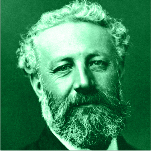
Jules Gabriel Verne was born in Nantes, France in 1828. During his youth, he was deeply interested in travel and sailing, and at the age of just twelve tried to flee home and join a ship bound for the West Indies. Although his family wanted him to be a lawyer, Verne was only really interested in writing – when his father paid for him to go to Paris in 1848, ostensibly to study law, the twenty year-old spent all his time trying to sell his manuscripts and plays. Upon visiting him, and discovering how his son was spending his time, Verne’s father was horrified and cancelled his allowance.
Undeterred, Verne continued trying to interest people in his work. He met the world-famous authors Victor Hugo and Alexander Dumas, who aided him with techniques and advice. Short on funds, Verne began having to write in the public library because it was free and relatively warm. He read widely on the sciences and technology, taking hundreds of notes, and managed to start selling the occasional article. Gradually, Verne developed a relationship with Pierre-Jules Hetzel, one of the most important publishers of the 19th century, who helped him edit his work, and eventually published his first work Five Weeks in a Balloon, in 1863. This was a watershed moment for Verne, who over the next decade produced all of his major works: Journey to the Center of the Earth (1864), From the Earth to the Moon (1865), Twenty Thousand Leagues Under the Sea (1869), and Around the World in Eighty Days (1872). Most of his stories were first serialised in the Magazine d'Éducation et de Récréation, a Hetzel biweekly, before being published in the form of books.
Verne is especially notable now for having written about space, air, and underwater travel before any of these things had been properly invented. Despite suffering from something of a literary identity crisis – in that in some quarters he is still seen (to his fans’ dismay) exclusively as a children’s author – Verne’s work remains immensely popular. To date, he is the second most translated author in the world and is considered, along with H. G. Wells and others, as one of the masters of early science fiction.



